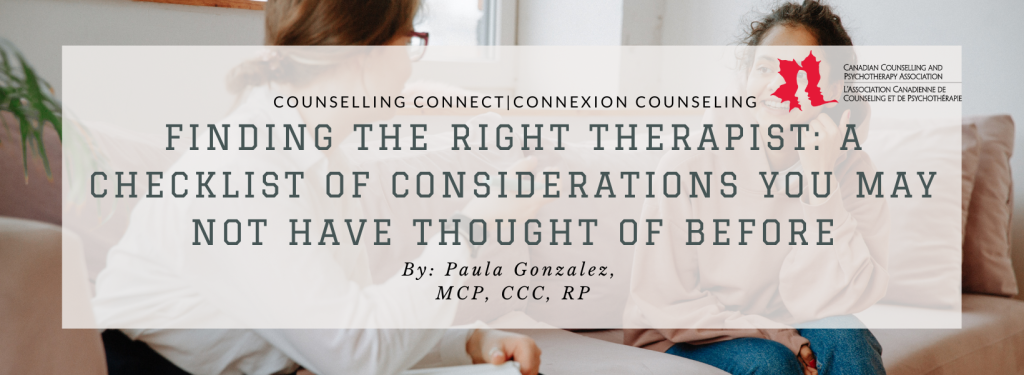
If you’re reading this, you’re probably someone who has been considering the idea of therapy for some time. Perhaps you’re someone who has gone to therapy before but went through the frustrating yet informative experience of not having found a therapist who was a “good fit”. Regardless of what has brought you to this blog, finding a therapist can be a daunting process. Afterall, you’re investing time, energy, trust, and money into another person who may or may not be the right fit, knowing that when you do find it, it can be life-changing.
Looking to find right fit, though, is part of what can make this process to daunting and overwhelming. Here’s a checklist of some considerations that you may not have thought of before to get you started:
- Do they have the right accreditations/credentials?
Since the act of psychotherapy is not something that is regulated by any province, just about anyone can call themselves a “therapist” or give themselves a similar title but not actually have the training, experience, and backing of a regulating college or association to ethically support clients. Accreditation is also important when leaning on extended health benefits to cover session costs since some insurance providers may only accept claims from mental health professionals of a particular designation. - Do their fees meet what I can afford?
Therapy is an investment, in terms of the time, energy, and money that goes into it. However, it is important to ensure that therapy feels accessible to you and does not become a burden. Depending on where you live, you may have several therapists to choose from, who may offer sessions at low cost, at sliding scale (often depending on what you can afford), or at full price. Make sure to find one that will meet your financial needs so that you can actually be present and engaged in your work instead of worrying about the cost! - Do they possess traits that could make me feel safe?
This one is more vague, but that’s because it can include any aspects of a therapist (beyond clinical approach) that would be helpful in making you feel safe with them. This can include anything from personality traits, training, cultural affiliation, gender, among other factors. Though trust is something that naturally develops over time no matter who your therapist is, but it is crucial that you can connect and feel confident about your therapist.
- Does their availability match mine?
Similar to the point above about fees, it’s important to be mindful of your availability to prevent therapy from becoming an added stressor for you. With regards to availability, check in with yourself about what days and times would work best for you to schedule a therapy appointment, without there being overlap with work, school, or other commitments. It is also important to ensure that your therapist has availability that would be able to accommodate the frequency of sessions you’re looking for.
Making the choice to seek professional support for your mental health is an incredibly courageous yet sometimes overwhelming decision because it can be intimidating to know where to start. The internet fortunately has tons of reputable resources that could remove some of the stress that comes with this decision. Ultimately, this is a decision that is yours to make and something that you can take your time with because it will be worth it in the end.
Stay tuned for more tips on finding the right therapist for you.
Paula Gonzalez, MCP, CCC, RP, is the founder of Infinite Horizons Psychotherapy (www.infinitehorizonspsychotherapy.com). She specializes in empowering young adults experiencing anxiety through psycho-education and trauma-informed CBT.
*The views expressed by our authors are personal opinions and do not necessarily reflect the views of the CCPA

